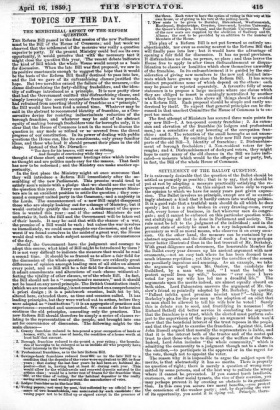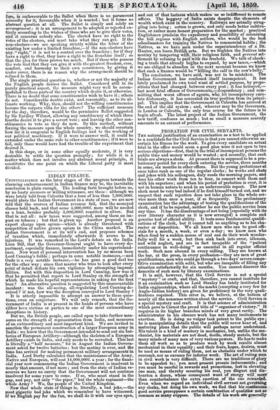SETTLEMENT OF- THE BALLOT QUESTION.
Jr is extremely desirable that the question of the Ballot-should be settled as promptly as possible ; that is to say, that it should be put at rest by adopting a measure practically satisfying the re- quirement of the public. On this subject we have only to repeat the opinion to which we have for many years past given expres- sion. The Ballot involves no principle except one of so exceed- ingly abstract a kind that it hardly enters into working politics. It is a good rule that a truthful- man should do all which he does openly ; but it is a rule broken in every drawing-room, every club, every house of business, in fact wherever men do congre- gate ; and it cannot be enforced on this particular question with- out stultifying all that is done in Parliament and society. The rule must be left to the judgment of the individual ; and in the present state of society he must be a very independent man, in pecuniary as well as moral means, who observes it on every occa- sion. On the other hand, the measure can be sustained by no abstract argument, and the difficulty of such a feat was perhaps never better illustrated than in the last trouvail of Mr. Berkeley. With great diligence and cleverness, the honourable Member for the Ballot every year dresses up his ancient argument with new ornaments,—not an easy task where he has been doomed to so much irksome repetition ; yet this year the novelties of the season are peculiarly ingenious and amusing. As- an example, we take the argument urged upon Mr. Onslow, the candidate for Guildford, by a man who said, "I want the ballot to. protect myself from toy -wife," because "ever since I have voted for you my wife has led me a dreadful life." The arguments upon the merits indeed, are almost equally absurd on both sides. Lord Palmerston answers the argument of Mr. On- slow's friend so pointedly adopted by Mr. Berkeley, by quoting " Palleat infelix quod proximo nesciat uxor ?"—taking Mr. Berkeley's plea for -the poor man as the adoption of an edict that no man shall be allowed to tell his wife how he voted ! Surely this is debate run to seed, and fructifying in nonsense ! Sir Richard Bethel did better service in oombating the argument that the franchise is a trust, which the elected must perform sub- ject to the supervision of the people ; an argument which wou'.d • show that the beneficial interest of the trust reposes in the people, and that they ought to exercise the franchise. Against this, Lord John Russell argued that morally the representative is liable, and that it is the interest both of the trustee and of the cestui qui trust to elect those who are to dispose of the welfare of the State. Indeed, Lord John includes "the whole community," which is - admitting the community to a judgment though not to a share in the election,—to participate in the approval or in the regret for the vote., though not to appoint the voter.
The reason why it is impossible to argue the subject upon the merits, is that abstractedly it has no merits. There is properly no question of right ; there is merely a question of wrong own- - mitted by some persons, and of the best way to palliate the wrong
where it cannot be prevented. If yen cannot teach lamllortle, customers, or other social tyrants, the vice of their coercion,. you may perhaps prevent it by erecting an obstacle to its gratifica- tion. In this ease you secure two moral benefits,—you proteet the conscience of the weaker party ; and, by depriviag th(v
!
of its opportunity, you assist it in dying out. Prinezpk, tttere-
fore, is unfavourable to the Ballot when there is no paramount necessity for it, favourable when it is wanted ; but it forms no abstract question at all. The Ballot is simply and solely an arrangement ; it is an arrangement to be adopted or rejected en- tirely according to the wishes of those who are to give their votes, and it concerns nobody else. The elected have no right to the votes of the electors, and must take what they can get. If the non-electors—we are speaking strictly within the letter of the existing law under a limited franchise,—if the non-electors have any," right," it is not to a control over the franchise ; for if they have a right to that, they have a right to the franchise itself; so that, the plea for them proves too much. But if those who possess the vote find that they can give it with the greatest freedom, ease, comfort, and harmony to their own consciences, by giving it under cover, there is no reason why the arrangement should be refused to them.
The single practical question is, whether or not the majority of the English people desires the Ballot. Considered still in its purely practical aspect, the measure might very well be accom- modated to those parts of the country which desire it, or otherwise. There is no doubt that some constituencies wish to have it ; others do not. Considerable doubts exist, and reasonably, as to its ul- timate working. Why, then, should not the willing constituencies become the corpora villa for the others ? The sufficient measure for the day, therefore, would be the permissive Ballot suggested by Sir Eardley Wilmot, allowing any constituency of which three fourths desire it to give a covert vote ; and leaving the other con- stituencies to vote as they do now. By this method, without forcing the measure upon the whole country, we should ascertain how far it is congenial to English feelings and to the working of our political machinery. If it were to answer well, it could be extended under the same rule to other constituencies ; if it were to fail, only those would have had the trouble of the experiment that desired it.
In this shape, or in some other equally moderate, it is very desirable to settle the question promptly; for while it is a matter which does not involve any abstract moral principle, it constitutes the one point on which the Liberal party is most divided.



























 Previous page
Previous page